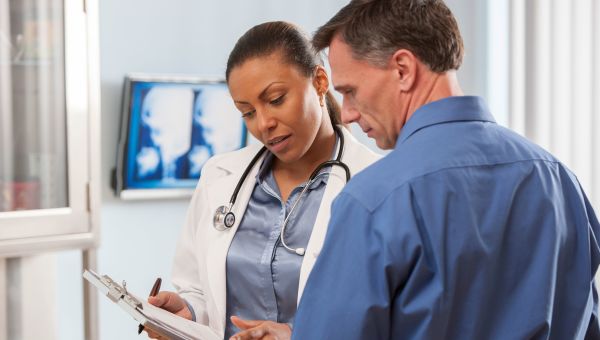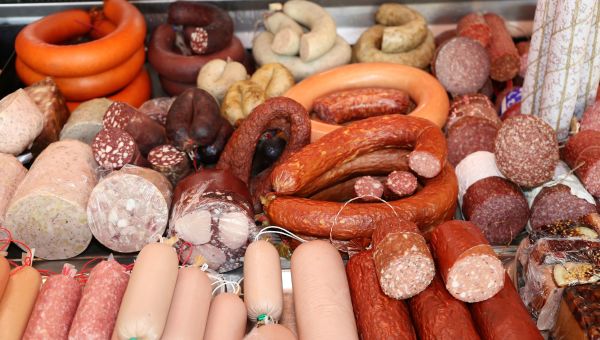6 stomach cancer risk factors you can control
While genetics play a role in one’s risk, eating the right foods, exercising and avoiding smoking can help lower your odds for this type of cancer.

Back in the 1930s, stomach (or gastric) cancer affected more people in the United States than any other type of cancer. Today, stomach cancer is way down the list of the country’s most common cancer diagnoses, according to the American Cancer Society (ACS). What’s behind the decline?
Certain lifestyle changes have helped prevent more people from developing this type of cancer, says Anthony DeBenedet, MD, a gastroenterologist affiliated with Saint Joseph Mercy Health System in Ann Arbor, Michigan.
Currently, there are about 26,240 people diagnosed with stomach cancer each year in the U.S. and about 10,800 people will die from it. Compared to other cancers, “stomach cancer isn’t common,” says Dr. DeBenedet. Indeed, the ACS reports that the number of people diagnosed with stomach cancer has gone down about 1.5 percent each year in the past decade.

Prevention is Key
Patients have the best chance of recovering from stomach cancer when it’s caught early. But according to the National Cancer Institute, the disease is often diagnosed at an advanced stage when it still may be treated but is difficult to cure. That’s why it’s important to know about risk factors that you can control to help reduce your risk.
There are some things that increase your risk for stomach cancer that you can't change, such as your family history and genes, as well as your ethnicity and sometimes where you live in the world. But there are other risk factors that you can control. Read on to learn more about what you can do to lower your risk.

Eat Fewer Smoked, Salted and Pickled Foods
Food preservation methods have changed significantly in the past century and that has helped reduce the incidence of stomach cancer. “We are not using salt to preserve foods the way we used to, and salt has been implicated as a risk factor,” says DeBenedet. “We are eating much fresher foods now.”
Although there are still plenty of salt-preserved and processed foods available in American grocery stores, reducing your intake may help reduce your risk. Some foods to avoid include processed or smoked meat such as sausage, bacon and salami as well as other cured meats, fish and jerky, says DeBenedet.
These foods can contain nitrates and nitrites, preservatives that “get broken down in the stomach and may cause damage to stomach tissue,” says DeBenedet. That damage has been linked to stomach cancer in research animals, notes the ACS.
“Sandwiches are staples of the U.S. diet, particularly cold cut sandwiches, but look for turkey or ham that is organic or all-natural,” says DeBenedet. “Many brands are offering these options now.” A lot of foods in this category are labeled as containing no nitrites or nitrates, DeBenedet adds. Your doctor can advise on building a healthful eating plan, particularly if you have dietary restrictions.

Add More Produce to Your Plate
Here’s another reason to load up on fresh fruits and vegetables:
“The vitamin C we get in citrus fruits and vegetables—such as green and red peppers—is believed to be protective against nitrites and nitrates breaking down into carcinogens in the stomach,” says DeBenedet.
Eating as many fresh fruits and vegetables as you can is a good strategy, DeBenedet says. Go for a range of types, with a variety of colors, and eat your fruits and vegetables uncooked as much as you can. Aim for produce high in fiber, too. Some research suggests that dietary fiber may reduce the risk of stomach cancer.

Maintain a Healthy Weight
Being overweight or obese is believed to be a possible cause of cancers of the upper part of the stomach nearest the esophagus, also known as the cardia, although the strength of that link has not yet been fully established.
DeBenedet, meanwhile, notes that obesity has been associated not just with certain types of stomach cancer, but also type 2 diabetes and heart disease. For overall health, do your best to get to or maintain a healthy weight for your frame and height. “Keep it as healthy as you can but don’t go crazy,” he says. “The world would be a glum place without a little pleasure every now and then."
Roughly speaking, DeBenedet explains, if your body mass index is 30, “perhaps losing 10 to 15 pounds will give you better odds against developing type 2 diabetes and several kinds of cancer.” Check with your doctor about the specific degree of weight loss that may help reduce your disease risk.

Stay Active
Daily or near-daily exercise can help with weight control, and “is important for longevity,” says DeBenedet. An article published in August 2016 in the New England Journal of Medicine reported that less body fat led to lower rates of different types of cancer, including gastric cardia cancer.
How much exercise is enough? The 2008 Physical Activity Guidelines for Americans Summary—the most recent data available from the Office of Disease Prevention and Health Promotion—recommends at least 2.5 hours of moderate intensity exercise or at least 1.25 hours of vigorous exercise per week. The report noted that even more health benefits accrue from getting 5 hours of vigorous exercise a week.

Quit Smoking
“Smoking is clearly a risk factor” in developing stomach or any kind of cancer, says DeBenedet. The ACS reports that smoking particularly increases risk for those cancers of the upper portion of the stomach near the esophagus. Smokers, in fact, have roughly double the risk of stomach cancer as non-smokers.
If you smoke, it’s never too late to quit. You’ll not only lower your risk of stomach cancer—but by quitting now, you’ll benefit your heart, your lungs and your overall health.

Treat H. pylori Aggressively
Helicobacter pylori (or H. pylori) is a kind of bacteria that may enter the body through unclean food or water or via contact with an infected person’s bodily fluids. It can infect the stomach lining and cause inflammation, which may lead to stomach cancer.
People with an H. pylori infection sometimes develop ulcers, which can cause burning stomach pain, bloating, nausea and weight loss. Although most people who carry this germ in their stomach never develop cancer, patients who are infected need to be treated by a healthcare provider to ensure it is eradicated, says DeBenedet.
More On


video

article

slideshow


video


video
